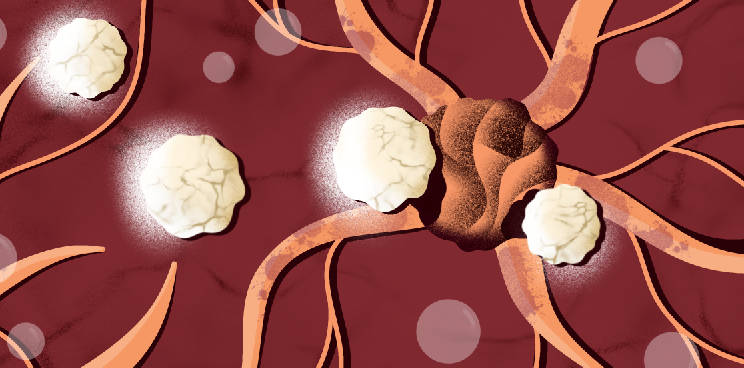Immunotherapy has revolutionized cancer treatment, offering promising avenues beyond traditional methods. Recent breakthroughs showcased at the Society for Immunotherapy of Cancer’s (SITC) annual meeting have spotlighted innovative approaches, notably chimeric antigen receptor macrophage (CAR-M) therapy, offering new strategies in the fight against solid tumors and addressing the limitations of current treatments.
Navigating the labyrinth: immunotherapy’s battle against solid tumors
Immunotherapy has shown remarkable success, especially in treating blood cancers. However, when it comes to solid tumors which occur in breast, lung or pancreatic cancers, the story changes. These masses are proving to be a true challenge for immunotherapy.
Solid tumors, often dubbed “cold,” are particularly challenging. They are harder to detect for the immune system. They are entrenched within the tumor microenvironment (TME) and prevent immune cells from effectively responding. It is an area where conventional treatments, be it checkpoint inhibitors or CAR-T cell therapies, struggle to gain traction.
CAR-T cells have been highly successful in blood cancers but they stumble when faced with solid tumors. The personalized nature of CAR-T therapies, involving a patient-specific cell extraction and reintroduction, isn’t only time-consuming, it also represents significant logistical and financial expenses. Therefore, the widespread access to this treatment is limited.
Checkpoint inhibitors have showcased convincing results in reawakening the immune response against solid tumors. However, tumors tend to surpass these therapies by switching up their defenses.
It seems there is a need for new innovative approaches which could overcome these limits. This is where CAR-M therapies come in.
What is the mechanism of CAR macrophage therapy?
Carisma Therapeutics stands at the forefront of this new field. Its focus revolves around redefining strategies to combat solid tumors, notably through the development of CAR-M therapies.
CAR macrophage therapy represents a significant scientific advancement in cancer treatment. This innovation exploits the capabilities of macrophages, empowering them with engineered chimeric antigen receptors (CARs). CAR-M is designed to target tumors with precision, within the tumor microenvironment (TME).
These reprogrammed macrophages can easily infiltrate the TME. Macrophages are an important constitutive element of tumor mass, allowing them to get clearance. Once they are in, they summon tumor-killer cells which, in turn, target the tumor from within. CAR-M acts as an undercover agent to release other immune cells in the TME, as they would usually have much more barriers to entry.
CT-0508: Carisma’s encouraging candidate in addressing HER2+ cancers
Within Carisma’s research portfolio, CT-0508 is a promising contender, showcasing notable strides in preclinical studies directed at HER2+ cancers. This lead candidate demonstrates potential advancements in targeting specific tumor types, hinting at broader implications across various solid tumors.
In focused studies targeting HER2+ cancers, this solution exhibits promising outcomes, showing improvements in overall survival rates. While these advances primarily focus on a particular cancer subset, the implications extend towards a potential approach for diverse solid tumors.
This candidate lays the groundwork for potential advancements in solid tumor therapies, hinting at a possible future where diverse tumor types might find tailored solutions through similar strategies.
Carisma charts a strategic course towards clinical testing, outlining phase 1 plans for CT-0508’s transition from lab success to real-world application. The impending clinical trials bear the weight of expectations. The completion of the trial is estimated in December, 2024. Will CAR macrophage therapy’s mechanisms prove efficient in live settings?
What are the potential applications of CAR-M therapy beyong oncology?
The potential of CAR-M extends beyond oncology. The concept explores possibilities in addressing neurodegenerative diseases and inflammatory conditions, offering a versatile platform that might extend therapeutic benefits to conditions beyond cancer.
Indeed, macrophages are heterogenous. In addition to their cancer-cells-clearing potential, they have tissue regeneration properties. ClinicalTrials.gov records several trials for macrophages cell therapy. The areas of action are various: pulmonary alveolar proteinosis (PAP) and neurodegenerative diseases are applications which show promise.
In animal trials, only one pulmonary macrophage transplantation resulted in the full treatment of the lung disease. In these trials, the treatment was safe.
The efficacy of stem cell engraftment is limited by the size of the human brain. The field is facing difficulties in the homogeneous distribution of the cells. Still in trial phases, cells derived from macrophages have had promising results in solving this issue. The cells were transferred through a bone marrow transplant, and have allowed a more efficient distribution in the brain.
To reach their objectives in cancer research, Carisma Therapeutics is already collaborating with industry giant Moderna. Under their agreement, Carisma received a $45 million payment, and Moderna made a $35 million investment in the form of a convertible note. Carisma will also receive research funding throughout the collaboration. Carisma Therapeutic remains in charge of the research and development of candidates, while Moderna will take the lead in clinical development and commercialization.
The emergence of CAR-M therapies could mark a significant leap forward in immunotherapy. With Carisma Therapeutics at the forefront, its promising preclinical success and imminent clinical trials of CT-0508, innovative immunotherapies might offer new possibilities in combating solid tumors, and even extend their action to other conditions and diseases.

New technologies related to macrophages
- Optogenetic Fc Receptor for Precise Control Over Macrophage Anti-Cancer Response – University of California, Santa Barbara
- BG34-200: A Potent Immunotherapeutic for Pancreatic Ductal Adenocarcinoma, Melanoma, Osteosarcoma, and other Solid Tumor Cancers – Case Western Reserve University
- Tools and Methods to Enhance Viability of Antigen-Presenting Cells for Cell-Based Therapy – Institut Carie





